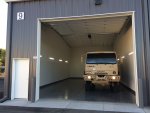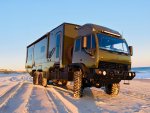Just saw this thread - how difficult was it to get the truck up and actually running? I've considered this platform for a bit now but the fact that many aren't running and there's a huge price gap up to running makes me wonder. I'm handy with tools and experienced on gas motors, but the diesels are new to me. I know tech manuals are out there for the downloading (and I may have already downloaded one), but would love to hear someone's personal experience.
Frankly I got pretty lucky with mine, since with the auctions, your best bet is to hunt for one that "looks" good, and go on that, since you won't get much information otherwise (unless there's parts straight up missing). I just took my time for a rig that came from a dry climate, was visually intact, and didn't seem to be leaking anything horribly, and it turned out to be OK in the end. Root cause turned out to be gelled fuel/fluids from sitting, and an issue with the starter (bad solenoid) so once the thing was de-gunked it was pretty much good to go. Nonetheless I took it to a few professional shops before taking it out on the road, for safety's sake.
As a general rule if you're OK taking a gamble on a non-runner, check for signs of it getting ratfucked for parts. Missing turret is a big one, especially since an interior that's been rained on regularly is going to be no fun. A big telltale for me that piqued my interest in my truck was the fact that it had the LED light upgrade, and still had both door handles. Those things get swiped/broken constantly on these things, so to me was an indicator that the rest of the truck was properly intact.
I will say a good multimeter (that will read 24v, the truck is dual-voltage) would be a must, since electrical gremlins can often be the cause of these things getting dumped. They're not hard to work on, but due to the size, tracking down wiring issues can be time consuming. Long-reach tools, plenty of deep-well sockets, and a big dead-blow hammer are also really helpful.
As far as the engine goes, the 3116 is considered quite reliable. However, as it's all mechanically-injected, there's a certain amount of sorcery going on to keep all that operating. It requires expensive special tools, and the right kind of person who knows the engine, so making friends with your local Cat shop would be a good idea. The rest is pretty straight forward. Transmission can be checked out/serviced by most heavy-duty shops that know a thing or two about Allison's, and any old heavy diesel/OTR shop will suffice for the rest.
Routine maintenance is very easy on these, but have lots of 5-gallon buckets on hand, and expect to get quizzical looks from your local NAPA walking out with 8 gallons of gear oil










